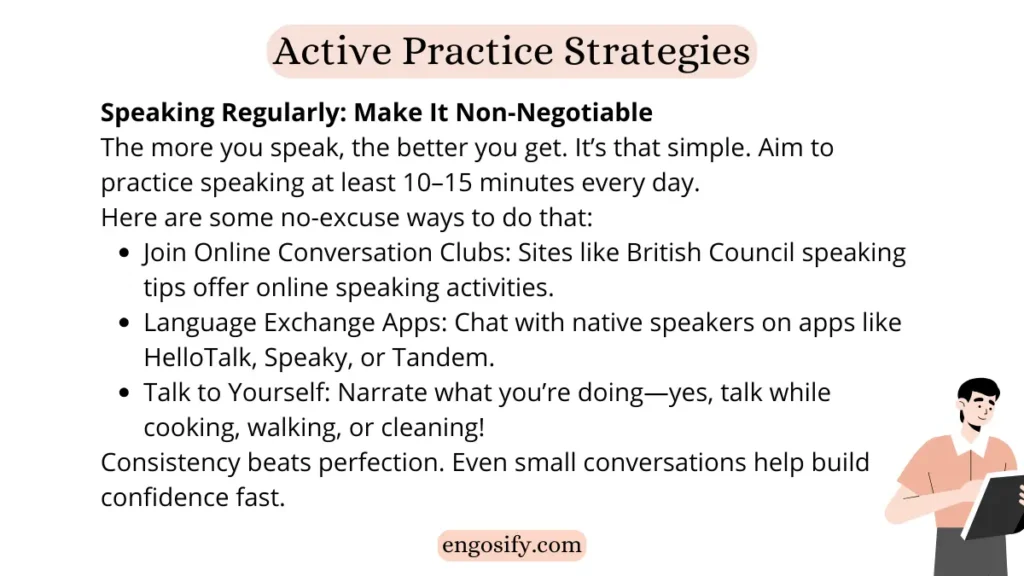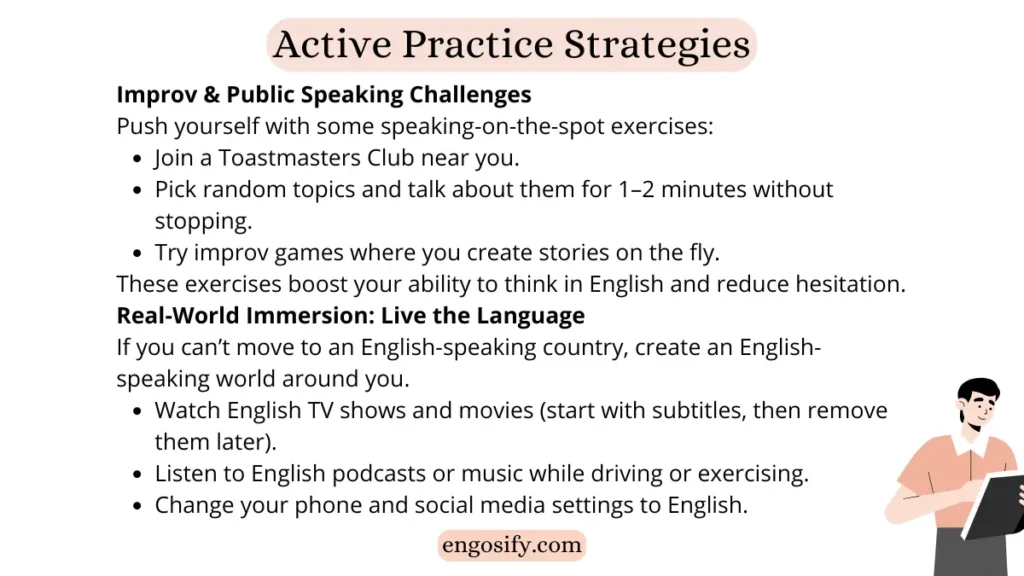Introduction
Do you ever feel stuck when trying to speak English? Like the words are on the tip of your tongue but just won’t come out? You’re not alone! Millions of learners worldwide face this challenge every day. The good news? You don’t have to wait years to see results. With the right approach and a few smart strategies, you can improve your English speaking skills fast and sound more fluent, confident, and natural in no time.
In this article, we’re diving deep into practical methods that actually work. From building your vocabulary and sharpening your pronunciation to real-world speaking hacks and maintaining consistency, this guide covers it all. Plus, we’ll answer burning questions like “How long does it take to become fluent?” and “Can I improve without a partner?”
So, buckle up! Let’s kick off your journey toward speaking better English—fast!
Why Improving Your English Speaking Skills Is Important
The Power of English in Today’s World
It’s no secret that English is the global language—spoken by over 1.5 billion people! Whether you’re traveling, job hunting, studying abroad, or making new friends online, strong English speaking skills open doors everywhere.
Just imagine confidently giving a presentation at work, chatting with tourists in your city, or even participating in international conferences without breaking a sweat. Sounds exciting, right?
Unlocking Opportunities
When you can speak English fluently, your career options explode. From customer service and sales to tech and education, many employers today demand good spoken English. According to research by the British Council, communication skills in English are among the top sought-after qualifications globally.
Additionally, social opportunities multiply. You can join online communities, take part in study exchanges, or even travel solo with ease. No more awkward silences at networking events or miscommunication during interviews!
Boosting Self-Confidence
And here’s the kicker—improving your speaking doesn’t just help your professional life; it transforms your self-confidence too. Imagine the rush you’ll feel when you crack jokes in English or share your ideas clearly during a group discussion.
So, now that you know why it matters, let’s dive into the next step: building solid foundations for faster improvement.

Foundations of Fast Improvement
Alright! Now that you’re pumped and ready, let’s dive into the real work—laying a strong foundation for your speaking journey. If you want to improve your English speaking skills fast, you can’t skip this part.
Daily Vocabulary Expansion
First things first: words are your tools. Without them, you can’t build sentences, let alone hold a conversation. But here’s the thing—you don’t need to learn thousands of words at once.
Instead, aim for small, steady progress. Try learning 3 to 10 new words or phrases a day, but make sure you use them! Write sentences, say them aloud, or even challenge yourself to use them during your next chat.
Pro tip: Focus on phrases and idiomatic expressions like “on the same page” or “hit the nail on the head” instead of just single words. Context matters.
If you want a fun and reliable source for real-life vocabulary, check out the FluentU speaking strategies. They turn videos into language lessons—super engaging!
Pronunciation and Accent Practice
Okay, let’s talk pronunciation. You don’t need a perfect accent, but you do need to be clear and understandable.
Here’s where things like tongue twisters and shadowing techniques come in handy. Pick a short video or podcast by a native speaker. Then, listen and repeat—copy their speed, intonation, and rhythm.
Apps like Forvo or Google’s pronunciation tool are great for checking specific words. You can also record yourself and compare.
Working on your vowel sounds, word stress, and intonation patterns will boost your clarity fast.
Think in English
This tip sounds simple but feels challenging at first: Stop translating in your head!
Train your brain to think directly in English. Start small. Label things around your room in English. Narrate your daily routine in your mind:
- “I’m making coffee.”
- “Now I’m opening the door.”
Over time, this shift will speed up your responses during real conversations.
Grammar & Idioms in Context
You don’t need to memorize grammar rules like a textbook. Instead, learn grammar naturally while reading, listening, and speaking.
For example, pay attention to how native speakers use tenses or conditional sentences in everyday speech. Pick up useful collocations like “make a decision” or “take a chance.”
In short, grammar and idioms should feel like your friends, not your enemies.
Active Practice Strategies
Now that you’ve built a solid foundation, it’s time to roll up your sleeves and start speaking! Yes, practice makes perfect—or at least a whole lot better! To improve your English speaking skills fast, you need to actively use the language every single day. Let’s explore the most effective ways to do that.
Speaking Regularly: Make It a Daily Habit
If you only speak English once a month, progress will crawl. But when you make it a daily habit, magic happens.
Here are some easy ways to squeeze speaking practice into your routine:
- Language Exchange Apps: Try platforms like HelloTalk or Tandem to connect with native speakers.
- Find a Speaking Partner: A friend, tutor, or even a coworker can help.
- Join Conversation Clubs: Whether local or online, these provide real-time, pressure-free practice.
According to the British Council speaking tips, real-time conversation is one of the fastest ways to build fluency.
Shadowing & Imitation: Copy to Learn
Ever tried shadowing? It’s a powerful technique where you listen to a native speaker and immediately repeat what they say—mimicking their speed, rhythm, and tone.
Pick short clips from movies, TED Talks, or podcasts. Start slow, then speed up as you get more comfortable. This method not only boosts pronunciation but also helps with sentence flow and intonation patterns.
Recording Yourself & Getting Feedback
Feeling brave? Record yourself speaking English. Talk about your day, describe a picture, or explain a topic.
Then, play it back. Listen for things like:
- Clear pronunciation
- Proper use of tenses
- Natural pauses and rhythm
If possible, share your recordings with a teacher or a fluent friend. Honest feedback can highlight things you never noticed.

Tongue Twisters & Fluency Drills
Struggling with tricky sounds? Enter: tongue twisters! Not only are they fun, but they also help with speed, clarity, and muscle memory for your mouth.
Try classics like:
- “She sells seashells by the seashore.”
- “Peter Piper picked a peck of pickled peppers.”
Practice slowly at first, then increase your speed.
Real-World Immersion: Surround Yourself with English
If you’re serious about fast improvement, surround yourself with English 24/7. Here’s how:
- Watch English TV shows or YouTube channels (without subtitles at times)
- Listen to English podcasts while commuting
- Change your phone and social media settings to English
- Read English blogs, books, and news sites
The more English you hear, the more natural it becomes to speak.
Improv & Public Speaking
Finally, challenge yourself with improv exercises or public speaking activities. Even speaking for just 2 minutes on a random topic helps.
Look for local Toastmasters clubs or practice solo by picking a topic, setting a timer, and talking without stopping. This builds both fluency and confidence—fast!
Sustaining Fast Improvement
Alright, you’ve laid the foundation and kicked off active practice. But how do you keep the momentum going? Let’s face it—staying consistent is often the hardest part when trying to improve your English speaking skills fast. Luckily, with a few smart habits, you’ll stay on track and keep seeing results.
Consistency & Daily Habits
Consistency beats intensity every time. Speaking English for 10 minutes a day is way more effective than cramming for two hours once a week.
Here’s how to build habits that stick:
- Set a Daily Reminder: Block a time on your calendar for speaking practice.
- Micro-Practice: Even short tasks like describing what you see or thinking aloud in English count.
- Accountability Buddy: Pair up with someone who’ll check in on your progress.
According to the Preply fluency guide, making English a part of your daily routine accelerates improvement like nothing else.
Setting SMART Goals
Wandering without a goal? Not helpful. Instead, set SMART goals:
- Specific: “I’ll practice speaking for 15 minutes daily.”
- Measurable: Track how many words or phrases you learn each day.
- Achievable: Don’t aim for 5 hours a day if you’re busy.
- Relevant: Focus on goals that improve your speaking.
- Time-bound: “I want to master 30 new phrases this month.”
Write your goals down. Check your progress weekly. Reward yourself when you hit milestones!
Embrace Mistakes & Build Confidence
Here’s the truth: You’ll make mistakes. And that’s perfectly okay! In fact, making mistakes is proof that you’re learning.
Try this mindset shift:
- Instead of thinking, “I hope I don’t make mistakes,”
- Think, “I’m excited to learn something new today!”
Fake confidence if you must. Smile, speak louder, and keep going even if you stumble. Remember, fluency comes with fearless practice.

Use Technology Wisely
Technology’s your friend—but only if you use it right. Don’t just scroll TikTok endlessly (unless it’s in English ). Instead:
- Use pronunciation apps like ELSA Speak
- Try speech analysis tools that show where you need improvement
- Join online speaking rooms or virtual meetups
Also, recording apps help track your daily speaking goals.
With the right tools and mindset, staying consistent and making fast progress is totally doable.
FAQs
You’ve learned the foundations, mastered active practice, and built consistency. But wait—what about those burning questions that pop up when you’re trying to improve your English speaking skills fast? Let’s tackle the most common ones learners ask (yes, straight from Google’s People Also Ask section!).
How long does it take to speak English fluently?
Great question! Honestly, there’s no one-size-fits-all answer. It depends on your current level, how much time you practice daily, and how often you speak with real people.
However, if you practice speaking consistently for at least 15–30 minutes a day, many learners start noticing big improvements in just 3 to 6 months. That’s right—fluency doesn’t have to take years!
What is the fastest way to learn spoken English?
Without a doubt, daily speaking practice is key. Combine that with:
- Listening to native speakers (podcasts, YouTube, TV shows)
- Shadowing techniques
- Expanding your vocabulary with context
- Thinking in English
And don’t forget: get feedback often! Language exchange apps or online tutors can help correct mistakes quickly. For a detailed breakdown of proven techniques, check out this helpful resource on FluentU speaking strategies.
Can immersion alone make me fluent?
Immersion works wonders, but it’s not magic. Surrounding yourself with English helps you think faster and absorb vocabulary naturally.
However, you’ll still need to actively practice speaking out loud, join conversations, and sometimes study tricky grammar points. Think of immersion as your environment, and speaking practice as your workout!
How do I practice speaking without a partner?
No partner? No problem! Here are quick solo practice hacks:
- Talk to yourself about your day, plans, or opinions
- Record yourself and review your speech
- Shadow native speakers from videos or podcasts
- Use AI language apps that simulate conversation
You can also participate in online speaking forums or use chatbots that reply to your sentences in real-time.
Is accent reduction necessary?
Here’s the truth: Clarity beats perfection.
You don’t need to sound like a native speaker. Focus on clear pronunciation, natural intonation, and being understandable.
Conclusion
So, there you have it—your roadmap to improving your English speaking skills fast. From building your vocabulary and practicing pronunciation to diving into real conversations and staying consistent, every step counts.
Remember, the secret sauce isn’t just hard work; it’s smart work combined with daily practice and a fearless attitude toward making mistakes. The more you speak, the more natural it becomes.
Now it’s your turn: start small, stay consistent, and watch your confidence soar. Don’t be shy—share your progress, ask questions, or tell us about your favorite practice method in the comments below! Let’s keep the conversation going and help each other become fluent faster.
You’ve got this!

